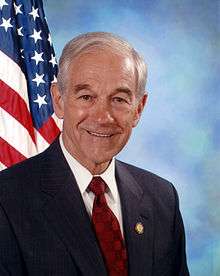New Hampshire Republican primary, 2008
| |||||||||||||||||||||||||||||||||||||||||||||||||||||
| |||||||||||||||||||||||||||||||||||||||||||||||||||||
|
Precinct Results Blue denotes precincts won by McCain, Red denotes those won by Romney, Green denotes those won by Huckabee, and Yellow denotes that won by Ron Paul. | |||||||||||||||||||||||||||||||||||||||||||||||||||||
| Elections in New Hampshire |
|---|
 |
The 2008 New Hampshire Republican primary took place on January 8, 2008, with 12 national delegates being allocated proportionally to the popular vote.[1] Arizona Senator John McCain won 7 of the delegates.
Independent voters made up 44 percent of the New Hampshire electorate and could choose to vote in either this primary or the Democratic Party's contest held on the same day, but voters could not vote in both.[2]
Polling
In the days leading up to the primary, John McCain appeared to gain a slight lead over Mitt Romney. Average support from polls were McCain, 31.8%; Romney, 28.2%; Huckabee, 12.2%; Giuliani, 9.3%; Paul, 8.2%; Thompson, 2.2%.[3]
Results
The official return was certified by the New Hampshire Secretary of State on 9 January.[4] According to New Hampshire law, delegates are allocated proportionally with a minimum 10% threshold required to receive delegates. The balance of delegates that are not assigned are then allocated to the winner.
| Candidate | Votes | Percentage | Delegates |
|---|---|---|---|
| John McCain | 88,571 | 37.71% | 7 |
| Mitt Romney | 75,546 | 32.17% | 4 |
| Mike Huckabee | 26,859 | 11.44% | 1 |
| Rudy Giuliani | 20,439 | 8.7% | 0 |
| Ron Paul | 18,308 | 7.8% | 0 |
| Fred Thompson | 2,890 | 1.23% | 0 |
| Duncan Hunter | 1,217 | 0.52% | 0 |
| Alan Keyes | 203 | 0.09% | 0 |
| Stephen Marchuk | 123 | 0.05% | 0 |
| Tom Tancredo* | 80 | 0.03% | 0 |
| Dr Hugh Cort | 53 | 0.02% | 0 |
| Cornelius Edward O'Connor | 45 | 0.02% | 0 |
| Albert Howard | 44 | 0.02% | 0 |
| Vern Wuensche | 44 | 0.02% | 0 |
| Vermin Supreme | 41 | 0.02% | 0 |
| John H. Cox | 39 | 0.02% | 0 |
| Daniel Gilbert | 33 | 0.01% | 0 |
| James Creighton Mitchell Jr. | 30 | 0.01% | 0 |
| Jack Shepard | 27 | 0.01% | 0 |
| Mark Klein | 19 | 0.01% | 0 |
| H. Neal Fendig Jr. | 13 | 0% | 0 |
| Scattered | 227 | 0.1% | 0 |
| Total | 234,851 | 100% | 12 |
* Candidate had already dropped out of the race prior to primary.
Recount
Most New Hampshire voters cast their votes on vulnerable Diebold optical-scan systems, leading election-reform activists to immediately begin examining the results from New Hampshire, claiming later to find evidence suggesting fraud.[5]
Republican presidential nominee candidate Albert Howard joined forces with Ron Paul supporters bankrolling a full recount of the Republican primary.[6] The Republican recount began on Wednesday January 16.[7]
The story initially was reported only online, but was later acknowledged by mainstream news outlets. Most observers have concluded that demographic trends influence both a community's means of counting ballots, and which candidates the community is likely to support.[8]
On January 10, 2008, presidential candidate Dennis Kucinich requested and paid for a recount to make sure that all of the votes in the Democratic primary were counted - Republican candidate Albert Howard also requested a recount in the Republican primary.[9]
The recount began on January 16, 2008 after New Hampshire Secretary of State Bill Gardner received $27,000 from Kucinich. The first ballots to be counted came from Manchester. The campaigns and fair elections groups had the right to see and approve every ballot. In the GOP recount the votes for all candidates were exactly the same except for Mitt Romney who received 1 extra vote. With $55,600, Albert Howard is the first person in U.S. history to receive a statewide New Hampshire Primary Recount.[10]
The Deputy Secretary of State, David Scanlan, estimated that the Republican recount cost $57,600 and the Democratic recount, with more votes cast, cost $67,600.[11]
According to Howard's campaign Web site, some of his primary objectives include banning electronic voting. Quin Monson, an assistant professor in the Department of Political Science at BYU, commented: "There are people that do not trust the technology. [The] request for the recount is likely a response to that crowd."[12]
See also
- New Hampshire Democratic primary, 2008
- New Hampshire primary
- Republican Party (United States) presidential primaries, 2008
References
- ↑ "Election Guide 2008 - Presidential Election - Politics". The New York Times.
- ↑ http://www.chron.com/disp/story.mpl/front/5431385.html
- ↑ RealClearPolitics - Election 2008 - New Hampshire Republican Primary
- ↑ "Presidential Primary Election January 8". New Hampshire Secretary of State. Retrieved 2008-01-11.
- ↑ "Was the New Hampshire vote stolen?".
- ↑ "Concord Monitor - Primary votes to be recounted".
- ↑ "New Hampshire to Recount Ballots in Light of Controversy".
- ↑ Beverley Wang (2008-01-11). "Experts skeptical of N.H. ballot-count conspiracy theory". The Boston Globe. AP. Retrieved 2008-03-14.
- ↑ "Kucinich claim spurs N.H. recount". Boston Herald. AP. Retrieved 2008-03-14.
- ↑ Kevin Landrigan (2008-01-27). "Recounting and recalling the N.H. presidential primary". Retrieved 2008-03-14.
- ↑ Tom Fahey (2008-01-15). "Recounts aren't cheap". New Hampshire Union Leader. Retrieved 2008-03-14.
- ↑ Erica Teichert (2008-01-16). "New Hampshire Recount Garners Little Attention". BYU Newsnet. Retrieved 2008-03-14.

.jpg)




